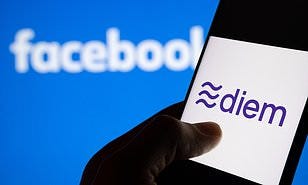Facebook takes on BitCoin
The idea behind Libra is that sending money should be as easy and secure as sending a message. Libra will be a global payment system.

Capital Thinking · Issue #788 · View online
In case you didn’t hear, this week the price of Bitcoin went through $50,000.
It’s been on quite a journey since breaking out of a white paper in 2008. At the beginning it was touted as a currency, a new medium for facilitating commerce. “Electronic cash,” Satoshi said.
People still talk about that time Laszlo Hanyecz bought two Papa John’s pizzas for 10,000 bitcoin – “like maybe two large ones so I have some left over for the next day.” (Ouch.)
Facebook’s Big Diem
Marc Rubenstein | Net Interest:
In the early days, the goal of pioneers in the space was to get Bitcoin accepted by merchants as a medium of payment.
Soon after its launch as a Bitcoin wallet, Coinbase began signing them up. By October 2014 it had ten $1 billion businesses plugged into its systems ready and willing to accept the new currency. Yet as a payment device, it didn’t really take off.
Transactions were slow and the price of Bitcoin was too volatile. Bitcoin morphed from a cryptocurrency to a crypto asset, reinventing itself as an alternative to gold. Having survived its ups and downs and lived to tell the tale, its status as a commodity is likely secure.
More fluid is the space it vacated in payments; that space remains a battleground. One contender there is Facebook.
Hesterno
In mid 2019, Facebook picked up the baton Bitcoin dropped with a splashy announcement to launch a cryptocurrency called Libra. Libra was all about payments.
“What we’re trying to do with Libra [is] rethink what a modern infrastructure for the financial system would be if you started it today rather than 50 years ago on a lot of outdated systems,” said Mark Zuckerberg.
Libra was marketed as a scheme to provide access to financial services for people around the world, in particular those in underdeveloped countries where mobile phone penetration is higher than banking penetration (a billion people in the world have one but not the other).
Libra aimed to squeeze down the cost of global money movement.
“The idea behind Libra is that sending money should be as easy and secure as sending a message. Libra will be a global payment system.”
Rather than pursue the “closed loop” model of payments, where Facebook controls the platform, the company chose to corral support for a new open network. It recruited 28 organisations from different industries to form the Libra Association.
The association would be a not-for-profit in the mould that Dee Hock first envisioned when he set up Visa over sixty years ago. And just as Bank of America agreed to seed Visa in anticipation of capturing a small piece of a larger, open network, Facebook thought the same about Libra.
It would sit on top of the network with its wallet Calibra, now called Novi, in the same way Bank of America cards sit on top of the Visa network. In a typical $100 card transaction today, Visa may take a $0.15 fee but the entity that has the attention of the consumer – the issuer – takes $2.00; that’s where the money is.
Libra designed its technology to be faster than Bitcoin, promising 1,000 transactions per second compared with Bitcoin’s seven. Not as fast as Visa, but that’s the trade off: efficiency versus trust.
Rather than have a single party maintain the transaction ledger, Libra would distribute it over its association members. By spreading trust out over multiple parties, Facebook was offering something traditional, centralised banking wasn’t; but by restricting maintenance to a consortium of ‘validators’, the process could be more efficient than Bitcoin, whose ledger is public.
The instrument of payment that Libra would deploy across its rails was a new currency, the Libra, whose value would be linked to a basket of traditional currencies. One Libra would be worth some mix of dollars, euros and pounds.
Not as volatile as Bitcoin then, so a user could be confident their purchasing power wouldn’t swing wildly between pizza nights.
But this is where policymakers started to get jumpy.

*Featured post photo credit: Aleksi Räisä on Unsplash
